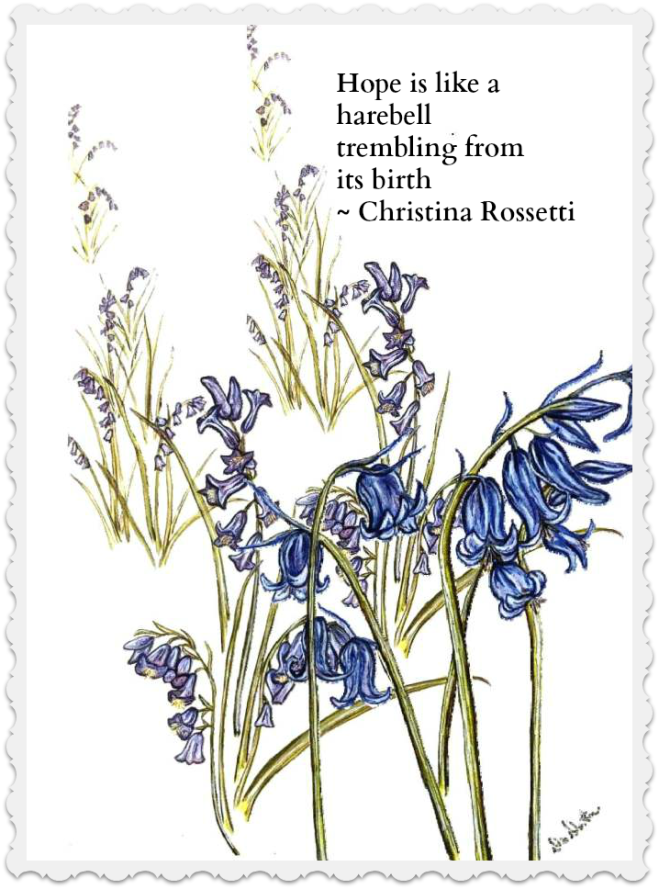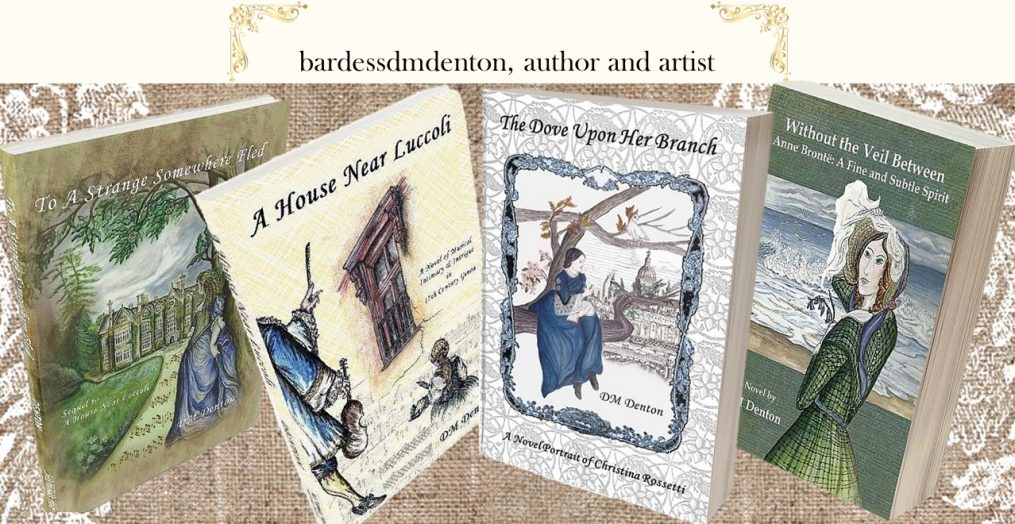From a letter Charlotte Brontë wrote to Hartley Coleridge, June 16, 1847:

Sir,
My relatives Ellis and Acton Bell and myself, heedless of the repeated warnings of various respectable publishers, have committed the rash act of printing a volume of poems.
The consequences predicted have, of course, overtaken us; our book is found to be a drug; no man needs it or heeds it. In the space of a year our publisher has disposed but of two copies and by what painful efforts, he succeeded in getting rid of those two himself only knows.
Before transferring the edition to the Trunk-makers, we have decided on distributing as presents, a few copies of what we cannot sell.
Besides demonstrating Charlotte’s wry humor, which, I have no doubt, masked her disappointment and frustration, her letter also reveals an important choice she made in order to move past this discouraging experience of presenting the Brontë sisters’ writing to the public. I might add that the poetry collection, which they paid to have published, did inspire a few positive reviews from newspaper critics.
I feel very grateful that Charlotte wrote that letter. Of course, she had no idea it would be preserved to reach out and beyond its original purpose and, for all those writers who would come after her, set a sagacious example of how to deal with setbacks, even failures, by acknowledging them, feeling the irony in them, confronting their implications without relinquishing future progress and possibilities to them.

Illustration Copyright 2016 by DM Denton

My mother’s Jane Eyre, 1941 Edition with woodcuts by Fritz Eichenberg
In a letter to her friend Ellen Nussey in October, 1844, Charlotte expressed a similar resilience in the face of defeat when “the enterprise of keeping a school”, which she and her sisters had devised to the point of sending out flyers/”cards of terms” and even thinking about alterations to the parsonage in order to accommodate it, didn’t materialize.
We have no present intention of breaking our hearts on the subject—still less of feeling mortified at defeat—The effort must be beneficial whatever the result may be—because it teaches us experience and an additional knowledge of the world.
In the autumn of 1845, Charlotte rather stealthily came upon Emily’s poems. Emily was furious at such an invasion of her privacy and insisted she didn’t write with any thought of publication—perhaps, afraid she might make an enemy of the constant companion writing was to her.
When weary with the long day’s care,
And earthly change from pain to pain,
And lost, and ready to despair,
Thy kind voice calls me back again:
Oh, my true friend! I am not lone,
While then canst speak with such a tone!
Charlotte, who managed to convince Emily to publish her poems under the pseudonym Ellis Bell, would not believe “a mind like (Emily’s) could not be without some latent spark of honorable ambition”.

Sketch by Emily Brontë
George Eliot also had her thoughts on how to approach any endeavor, likely with the activity of writing in mind:
Failure after long perseverance is much grander than to never have a striving good enough to be called failure.

A year ago this week, my second novel (historical fiction), To A Strange Somewhere Fled (dedication above), was published. As with my first, A House Near Luccoli, I was optimistic on its release and for its subsequent reception.
“What a fool you must be,” said my head to my heart, or my sterner to my softer self.
~ Anne Brontë, Agnes Grey
I don’t think I ever have or will fool myself into thinking my writing lends itself to mainstream appeal. However, I do still believe it can and should be read by many more than have already. I’m very grateful to every buyer, reader, and reviewer. But, if I’m honest, I have to admit I’ve had moments of feeling very frustrated, defeated, even of breaking my heart because I find myself questioning my lifelong calling to write.
Looking to those who have come before also helps, although there are contradicting philosophies …
The worst enemy to creativity is self-doubt. ~ Sylvia Plath
or
The writer who loses his self-doubt, who gives way as he grows old to a sudden euphoria, to prolixity, should stop writing immediately: the time has come for him to lay aside his pen. ~ Colette
My wish to survive and write more and feel “the effort must be beneficial whatever the result may be“, inclines me towards the latter advice. Sylvia Plath had hardly begun to explore her potential when she took her own life at the age of 31. In contrast and, in no way meaning to demean Plath’s ongoing struggle with depression, Colette lived out the natural span of her life to the age of 81, experiencing marital abuse and other difficulties and setbacks, taking detours on unexpected roads, often expressing philosophical optimism. “You will do foolish things, but do them with enthusiasm.” “Hope costs nothing.” “Be happy. It’s one way of being wise.”
I believe what made Colette a survivor was her ability to create out of the dark as well as the light: “Look for a long time at what pleases you, and longer still at what pains you…”

Colette in old age with one of her cats
So now, whenever I despair, I no longer expect my end, but some bit of luck, some commonplace little miracle which, like a glittering link, will mend again the necklace of my days.
~ Colette, The Vagabond
So what doesn’t kill you makes you stronger. Or, to paraphrase: what doesn’t stop you writing makes you more determined to do it.
In the past year, I have contributed three short biographies to The Literary Ladies Guide to the Writing Life: Mary Webb, Christina Rossetti, and, just this week, Jean Rhys (click each name to read them). In different ways, all three overcame discouragement to continue writing. Mary Webb attained some positive critical attention and even won the Prix Femina Vie Heureuse, but her books didn’t actually become commercially successful until shortly after her death in 1927 when Britain’s Prime Minister Stanley Baldwin publicly praised her writing (you can see an actual letter he wrote her here) and called her a neglected genius (Hmm … he couldn’t have said so a little sooner?).

Illustration Copyright 2016 by DM Denton
Yes, writers struggle with their own doubts, but also from others’ perceptions and avoidance, especially those close to them. They can’t help wondering if praise from those quarters is patronizing and, on the other hand, find it hard to deal with their work being dismissed or even ignored by those who “should” be the first to encourage and help to promote their work. Christina Rossetti’s own brother pronounced her too pious to care if her writing achieved any success, an unfounded assessment in view of her passion for and lifetime pursuit of poetic expression.
There is always another side, always. ~ Jean Rhys, Wide Sargasso Sea
Jean Rhys’ last novel, Wide Sargasso Sea, published when she was 76, finally brought her popular success and financial reward, but she wasn’t impressed, saying it had come “too late”. Yet, like Colette, in spite of a life resembling a roller-coaster ride of experiences, relationships, and sometimes crossed-purposes, and while rebelling against how “her obsession (to write) gripped her”, she also understood that writing got rid of obsessions and produced “clarification”, that even if she didn’t want to write, she had to since “life has no shape, art is necessary, it provides some shape, at least to hold on to”.

Jean Rhys
“All of writing is a huge lake. There are great rivers that feed the lake, like Tolstoy or Dostoyevsky. And then there are mere trickles, like Jean Rhys. All that matters is feeding the lake. I don’t matter. The lake matters. You must keep feeding the lake.” ~ Jean Rhys
When I was young, writing was about dreaming up and playing with stories until I grew tired of them.

Now, chosen by them, I honor them as they do me by giving them the best expression I can and persevering patiently when they are troubling because I know they will be ultimately rewarding to my sense of accomplishment and completeness—no matter the mathematical odds against them bringing me fame and fortune.
From To A Strange Somewhere Fled
No one was there, except whom she mournfully invited and didn’t hope would appear. Until something was forming and even stirring, one line then two, black marks turning into graceful strokes, almost half-a-page filled before she knew it, pouring like blood from a deep wound. If only she could keep it flowing, instead of grief drying it up and making it hard and leaving a stain with no poetry about it.

Ill-success failed to crush us: the mere effort to succeed had given a wonderful zest to existence; it must be pursued. ~ Charlotte Brontë
©Artwork and writing, unless otherwise indicated, are the property of Diane M Denton. Please request permission to reproduce or post elsewhere with a link back to bardessdmdenton. Thank you.

![]() ing – these promotions will gain more exposure, readers, and reviewers for the novel.
ing – these promotions will gain more exposure, readers, and reviewers for the novel.


































